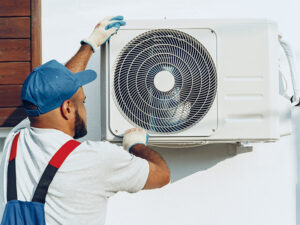Water Around AC Unit Outside During Summer: Should I Be Concerned?
Having water around your AC unit outside in summer might mean your AC unit has some issues. Let Davis Home Services diagnose and fix the problem when you call 844-226-9872!
Noticing water around your AC unit outside in summer can be a huge concern. Despite how sturdy your AC unit is, issues can still occur even if you regularly clean and maintain it. Maybe it’s just some minor moisture leaking or a giant puddle. Either way, having water around your AC unit calls for a diagnosis.
outside in summer can be a huge concern. Despite how sturdy your AC unit is, issues can still occur even if you regularly clean and maintain it. Maybe it’s just some minor moisture leaking or a giant puddle. Either way, having water around your AC unit calls for a diagnosis.
While there are some strategies you can use to diagnose an air conditioner leaking, you’ll want to use Moorestown’s top-rated AC repair to get everything back into shape.
How Does Your AC Unit Work?
It’s essential to know how your unit operates before determining if the water around your AC unit outside in summer is a problem. Doing so can help you determine if such moisture is part of its normal operations or if it’s a cause for concern.
Most units consist of both an outside and indoor unit. Your outside unit has a compressor and condenser, while your inside unit has evaporating coils. Essentially, there are four significant steps in providing your family with that cool indoor air:
- Liquid refrigerant travels through your evaporating coils, soaking up hot air inside your property.
- Your refrigerant liquid evaporates or turns to gas and this gas transfers to your compressor and into your condenser.
- When your hot air travels to your condenser, the heat’s released outside.
- Lastly, your refrigerant condenses into a cool liquid again, travels back to your evaporating coils, and cools your home.
When your coils become stuffed with this cool, liquid refrigerant, it’s normal for the humidity of outdoor air to cause condensation to drip. In this case, a small amount of water around your AC unit outside during summer is no concern.
One way to test if this is the case is to turn off your AC unit and see if such moisture dries up. If it does, then you most likely have nothing to worry about.
Water Due to Your Drain Line
Water gathering due to your drain line is another occurrence that’s typically of no concern. However, your indoor air’s humidity can also cause condensation on your evaporator coils. When this condensation forms, it’ll drip into your drain pan and exit your property via your drain line.
Check if moisture is forming first outside your home near your AC’s outdoor unit. If this is, then follow the source and determine if it’s your drain line. Typically, your drain line will be a PVC pipe, and if any water is dripping, you know your AC unit is functioning correctly.
When Water Around AC Units Is a Problem
There are some situations where you should be concerned if you see water around your AC unit outside during summer.
Damaged or Clogged Drain Lines
While some condensation from your drain lines is normal, excess moisture might mean that your drain line is either clogged, damaged, or fractured.
For maintaining your drain lines to prevent blockages, you can:
- Clear out your drain line using a vacuum at your drain’s exit. Many homeowners opt for a long wire brush.
- You can also reduce clog risks by flushing your drain line monthly using bleach mixed with water.
- If you’re still unable to remove blockages or discover damages (such as cracks), you’ll need to call an HVAC professional.
Damaged or Blocked Drip Pan
Sitting below your evaporator coils is your drip pan, and it gathers moisture while your air conditioning unit is cooling your home. Significant clogs or cracks in the pan may cause your drain line to become clogged. Instead of spilling water outside, it may also spill water inside rather.
To check and remove blockages from your drain pan, you should:
- Disconnect power and locate your drain pan.
- Remove all excess water using a vacuum to identify any potential clogs or damages.
- Remove any debris to stop the clog.
- Clean your drip pan to eliminate the risks of algae or mold growth.
- If you have damaged or cracked dip pans, these will need to be replaced or repaired.
Having Frozen Evaporator Coils
A water leak can also be traced to your evaporator coils freezing over. Frozen evaporator coils are often caused by:
- Inadequate airflow, generally because of a filthy air filter or not having enough refrigerant.
- Your compressor or reversing valve is causing your evaporator coils to freeze over.
- A buildup of ice on your evaporator coils starts to melt, creating an illusion of a leak.
If your coils are freezing or are entirely frozen, turn off your cooling unit while turning on your blower fan. As long as you have proper heating maintenance, this should warm up your evaporator coils. You’ll also want to inspect your air filter and replace it if necessary.
However, if you’re unable to find what’s causing your frozen coils or freeze again, calling an HVAC professional is your best bet.
The Benefits of a Professional HVAC Company
Hopefully, having water around your AC unit outside during summer isn’t a cause for concern. Sometimes it can be as simple as some additional condensation. However, having a professional HVAC team on your side can help rule out serious problems.
While there’s no set time for when you should check your AC unit, most experts recommend at least once a year before summer. Doing so can ensure your unit functions properly and efficiently and rule out problems that need significant repairs or replacements.
Call Davis Home Services Today
Your air conditioner is a vital tool to keep you and your family cool during those hot, sweaty months. However, you’ll want to ensure your unit gets the proper care it deserves. So, whether you’re noticing huge puddles outside or not, you’ll want to call Davis Home Services.
If your home AC is not cooling or you see water around your AC unit outside during summer, you should give Davis Home Services a call today at 844-226-9872!

